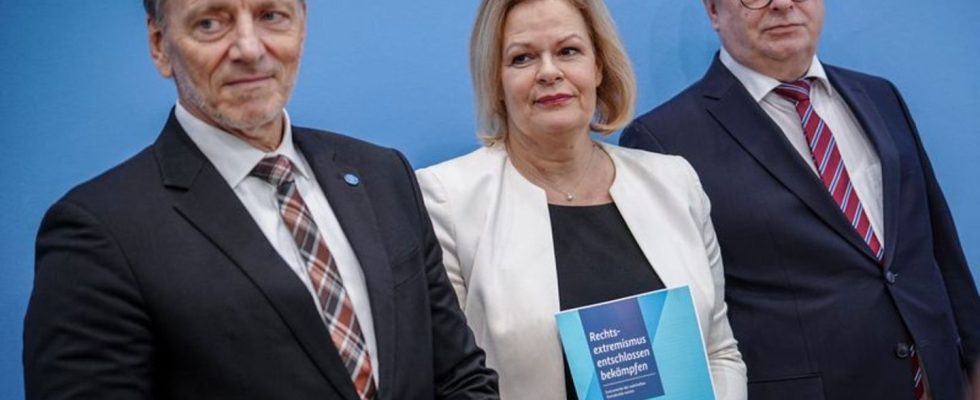Right-wing extremists no longer only network with radical like-minded people, warns the Federal Office for the Protection of the Constitution. His boss sees a worrying development.
The Office for the Protection of the Constitution warns against an expansion of right-wing extremist networks. A new, worrying development was observed last year. In addition to well-known right-wing actors, “officials from non-extremist parties, organizations and associations” have also recently come together at events, said the President of the Federal Office for the Protection of the Constitution, Thomas Haldenwang, in Berlin.
There, Federal Minister of the Interior Nancy Faeser presented a new 13-point catalog to intensify the fight against right-wing extremism. However, the majority of the projects listed are already known and some have already been decided.
“Loose relationships and loose networks”
The collaboration between right-wing extremists, some of whom are violently oriented, and parliamentarians at the federal and state levels is also worrying, said Haldenwang. The meeting in Potsdam in November, which the media company Correctiv made public in January, was an example of the expansion of the group of participants.
The President of the Federal Criminal Police Office, Holger Münch, also reported that “in the right-wing scene there are increasingly loose relationships and loose, sometimes virtual networks instead of ideologically consolidated and organized groups.” Faeser explained: “The so-called New Right in particular is trying to bring their inhumane ideology into the middle of society. The extended arm of these right-wing extremists reaches into our parliaments.” The AfD is classified by the Federal Office for the Protection of the Constitution as a suspected right-wing extremist case.
Camouflage and influence of right-wing extremists
Right-wing extremists disguised themselves and tried – “eating chalk, wearing sheep’s clothing” – to conceal their brutal ideas, warned Haldenwang. They took advantage of the population’s fears and experiences of crisis in order to radicalize the political fringes and bring their agenda into the middle class.
When it comes to right-wing extremism, attention should not only be paid to the willingness to use violence. “We have to be careful that corresponding thought and language patterns do not become embedded in our language.” Haldenwang gave examples of the terms “remigration” as the relocation of millions of people from Germany and the idea of “ethnopluralism”. “It sounds like diversity, but it means: each ethnic group should be in the area where they originally come from and separated from each other. And that shouldn’t mix together.” Discussions about such theses at relevant meetings are not punishable, but they still attack the free-democratic basic order and violate human dignity. Haldenwang said that the number of violent right-wing extremists, which was 14,000 in 2022, rose again in 2023.
Increasing threat from right-wing extremism
Faeser explained that right-wing extremism remains the greatest threat to the basic democratic order. BKA boss Münch said that the number of politically motivated crimes has more than doubled within ten years. “The increase in violent crime and hate crime is particularly worrying.” A peak was reached in 2023. “For the most part, these are propaganda crimes and sedition.” But even when it comes to violent crimes, there is no relaxation. The relevant statistics will be published in the spring.
Part of Faeser’s new paper is an “early detection unit” of the federal government on foreign manipulation and influence campaigns, which, in the minister’s words, will begin work “hopefully in a few months.” It has been agreed in the federal government, but should be located at the Ministry of the Interior. Like right-wing extremists, some foreign actors also wanted to weaken democracy in Germany, the paper says. “This is how autocratic states create artificial reach on the Internet with fake accounts, invent stories with AI-based images and feign credibility with copied newspaper websites.” The new early detection unit is intended to detect, stop or at least identify such campaigns in advance.
Reference to the 2022 action plan
The new projects are based on the “Action Plan Against Right-Wing Extremism,” which Faeser presented in March 2022. Some of them are already included in the previous paper.
“Instead of consistently working through the first plan, she immediately follows up with the next package,” said the spokesman for the Union parliamentary group for political extremism, Michael Breilmann (CDU), about Faeser. “It seems as if the Interior Minister is primarily concerned with communicatively embellishing her own half-time balance sheet.” Part of the action plan, for example, was the plans to tighten gun laws, in which Faeser again called for progress. The police union (GdP) also called for progress here. Faeser was hopeful that an agreement would be reached soon in the traffic light coalition. There are fears in the FDP that hunters could also be affected.
In the paper, the Interior Ministry also calls for a change to the Basic Law in order to better protect the Federal Constitutional Court from the influence of enemies of democracy.
Criticism of a one-sided focus on right-wing extremism
The domestic policy spokesman for the Union parliamentary group, Alexander Throm (CDU), accused Faeser of being blind in one eye. “The fight against right-wing extremism is important and right, but the minister is criminally neglecting the fight against Islamism and left-wing extremism and the associated anti-Semitism. That is irresponsible,” he told the dpa.
Faeser himself expressed his exasperation in an answer to a similar question: “Hopefully at some point in Germany I will be able to understand why you can never talk about one form of extremism without being asked about the others.” She emphasized: “We are taking tough action against all three forms of extremism.” Haldenwang described Islamism and Islamist terrorism as a “huge focus” for the Office for the Protection of the Constitution, but emphasized: “We do indeed see right-wing extremism as the greatest threat to our democracy and to security in Germany. In this respect, it is treated with a very high priority.”

